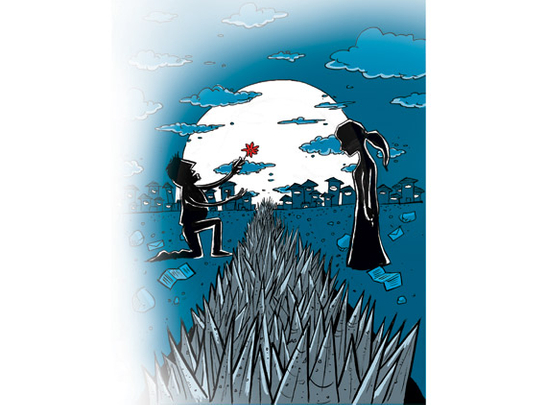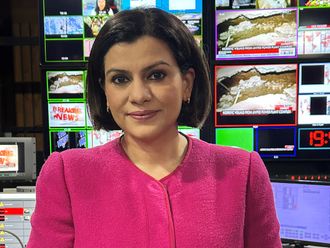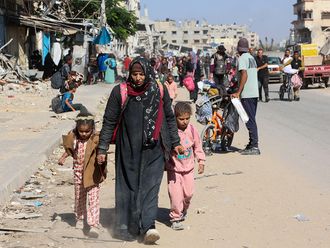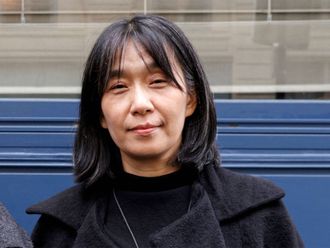
Even as India prepares to don the mantle of a 21st century superpower — buoyed by impressive economic growth, its high-tech prowess and increasing influence on the global political stage — its youth are being butchered in the name of ‘honour killings', a practice that dates back to the Dark Ages.
Honour killing is basically a euphemism for the murder of young men or women who are regarded as besmirching the family's reputation by marrying outside their religion or caste. A spin-off of India's infamous and deeply entrenched caste system, these horrific killings claimed over 15 lives in June across the northern states of Punjab, Haryana and Uttar Pradesh. In Haryana alone last week, six honour killings took place in as many days.
In Uttar Pradesh, two teenage girls were shot dead by a cousin last week for "daring" to meet their boyfriends. A village girl was torched alive after she had had a relationship with a boy from a different caste. In another case, a boy's hands and legs were chopped off in front of the entire village by its residents because he married a girl from their hamlet.
Many grooms — not approved by family or village elders — have been shot dead by the father or brother of the bride at the marriage venue. The forms of violence may also include public lynching, battery, torture, mutilation, rape, forced marriage and imprisonment within the home. In some cases, people's faces have been blackened or heads shaved. Some have been forced to eat excreta or drink urine, while others have faced lifelong ostracism.
Social sanction
The underlying belief behind the crimes is that the killing will nullify the ‘shame' or dishonour brought on the community by the youth. Worse, the murders carry social sanction and are usually carried out by mobs with the connivance of family members.
Unfortunately, this violence is also actively encouraged by the caste or khap panchayats, self-proclaimed bodies of village elders or the elite. Across swathes of rural India, caste panchayats deliberate on matters of marital or domestic discord or land-related issues. The villagers are known to give precedence to the khap judgment over that of even the legal panchayat. Interestingly, women are not members of either body.
Without doubt, central to this gruesome violence is the subordinate position women occupy on the Indian social landscape despite making up nearly half the country's demographic of 1.2 billion people. In fact women inhabit the lowest rung of the Indian social hierarchy, just a notch above dalits (untouchables). Regressive feudal mindsets still consider women to be familial ‘property', or as lowly beings who don't have the right to choose their partners.
Concrete action
To tackle the root of the problem, society should therefore be made more gender-sensitive and taught to eschew caste and class prejudices. Strict punitive measures for those who take justice into their own hands should also be enforced. So far, there is no specific law to deal with honour killings in India. The murders are included in the general categories of ‘homicide' or ‘manslaughter'. When a mob has carried out such attacks, it becomes even more difficult to zero in on the culprit.
That this heinous practice has the active backing of powerful politicians is a well-known fact. For the fear of losing caste vote banks, politicians not only fail to protect the youth but also don't dare speak up against panchayats as they are lucrative vote banks who exercise a strong influence on voters.
Recently, Haryana Chief Minister Bhupinder Singh Hooda supported khap panchayats, saying they were an ‘integral' part of the state's social fabric. Uttar Pradesh Chief Minister Mayawati, a vociferous politician who has an opinion on most matters, has also failed to condemn honour killings in her state.
Fortuitously, a public outcry and media attention have pushed this social evil to the centre of public debate. This has forced the Centre to consider legal deterrents against caste panchayats who order these murderous decrees.
Last week, Union law minister Veerappa Moily finally initiated a law to outlaw honour killings. The Bill is likely to be tabled in parliament in the upcoming monsoon session. The centre is also considering amendments to the Indian Penal Code, the Evidence Act and the Hindu Marriage Act, to pave the way for a new section to define such crimes.
Indeed, active policing and serious penal sanctions can be the only antidotes to the dishonourable practice of honour killings. There should be a ban on all decisions made by self-appointed courts in villages that violate the Indian Constitution or discriminate between caste and gender. The world's largest democracy can ill-afford to be a place where two young people can't fall in love and marry without the fear of death.
Neeta Lal is a New Delhi-based freelance journalist.









